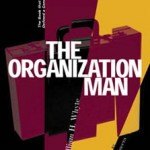
In 1956, Fortune magazine writer William H. Whyte published The Organization Man, a compilation of several years’ worth of reflections on white-collar work and corporate life. The book created a sensation and became a best-seller. Its thesis: The individualistic Protestant Ethic, which had defined the terms of work and upward mobility in the United States for decades, was being replaced by a new “social ethic,” which emphasized the group over the individual and stressed “belongingness” as the ultimate need of each person.
The “organization man” as Whyte saw him was most clearly glimpsed in the ranks of recent college graduates, whom he termed “a generation of bureaucrats.” What did they want? To pull themselves up by their own bootstraps? Success and wealth? Independence? No, their great desire was for security – to sign on to an organization for life, much as medieval monks had pledged themselves to the Catholic Church. Corporations’ hiring and promotion practices reinforced the sentiment: At General Electric, Whyte observed, programs for trainees focused not on an individual’s abilities but on the question “how well does he fit in?”
Many observers had taken note of the 1950s trend toward conformism and playing it safe, which contrasted strongly with the radicalism, risk-taking, and downright heroism of the immediately preceding decades. But Whyte’s analysis offered a deeper understanding, and indictment, of the period – and of what he believed to be a permanent shift in American culture.
I’ve been re-reading Whyte’s book (republished a few years back by the University of Pennsylvania Press) – while keeping one eye trained on the television series Mad Men, which is about to begin its fourth season on cable channel AMC. Fictional advertising man Donald Draper and his colleagues, after all, are beamed to us from the early 1960s – just four years down the road from the publication of The Organization Man.
television series Mad Men, which is about to begin its fourth season on cable channel AMC. Fictional advertising man Donald Draper and his colleagues, after all, are beamed to us from the early 1960s – just four years down the road from the publication of The Organization Man.
In many ways, Mad Men’s ad agency, Sterling Cooper, does not jibe with Whyte’s analysis. For example, Draper, Roger Sterling, Pete Campbell, and the others at the firm aren’t exactly into “belongingness”; their world is more like a shark tank in which slow swimmers and other unfortunates perish on a regular basis. Art director Salvatore Romano is purged because of his homosexuality, while copywriter Freddie Rumsen is forced out because he can’t hold his liquor. Such figures go down alone, with almost no support from their colleagues.
However, The Organization Man and Mad Men are in agreement on some profound matters. “The great packaged suburbs that have sprung up outside our cities since the war,” Whyte observes, are communities made in the image of the young Organization Man. More than anything else, he continued, they expressed the “rootlessness” that was key to such men’s experience. “Almost by definition,” he wrote, “the organization man is a man who left home and…kept on going.” Nor were they able ever to go home – because home was itself vastly transformed.
That’s Don Draper in a nutshell. The onetime Pennsylvania farm boy turned California auto salesman turned New York adman is rootlessness personified. Whyte had in mind the corporate functionaries who were regularly transferred by their companies from town to town: Long-distance moving companies reported that 40% to 50% of their clients were such corporate transferees. Although not a member of this group, Draper has caught their wave. His two-story, Ossining home complete with pert blonde wife (herself a transplant) and 2.5 children completes the profile.
Whyte also perceived that, far from becoming a class-bound society, America was becoming ever more dynamic. “The routes to advancement are not closing down, our classes are not freezing; quite the opposite, there have never been so many people moving in so many different ways,” he wrote. “As the middle class has expanded, the hereditary advantages of the upper strata have declined drastically.”
Once again, that’s Don Draper all over. He may have had to adopt a fake identity to make it happen, but his adland achievements are due not to family connections or status, but to his native abilities. After all, only a very slick operator could persuade a tobacco company that “It’s toasted” represents a worthy advertising slogan.

Have you ever thought about including a little bit more than just your articles? I mean, what you say is valuable and all. But just imagine if you added some great images or videos to give your posts more, “pop”! Your content is excellent but with images and videos, this website could undeniably be one of the very best in its niche. Amazing blog! Also, please visit my blog http://www.facebook.com/notes/bbq-grills-deals-online/review-of-fulcrum-clip-on-work-lightbbq-light/338734236143320
Greetings from Ohio! I’m bored at work so I decided to browse your website on my iphone during lunch break. I enjoy the info you provide here and can’t wait to take a look when I get home. I’m shocked at how quick your blog loaded on my cell phone .. I’m not even using WIFI, just 3G .. Anyways, very good blog! Also, please visit my blog http://www.facebook.com/notes/bath-supplies-deals-online/review-of-cosmetic-organizer-in-acrylic/139031642874457